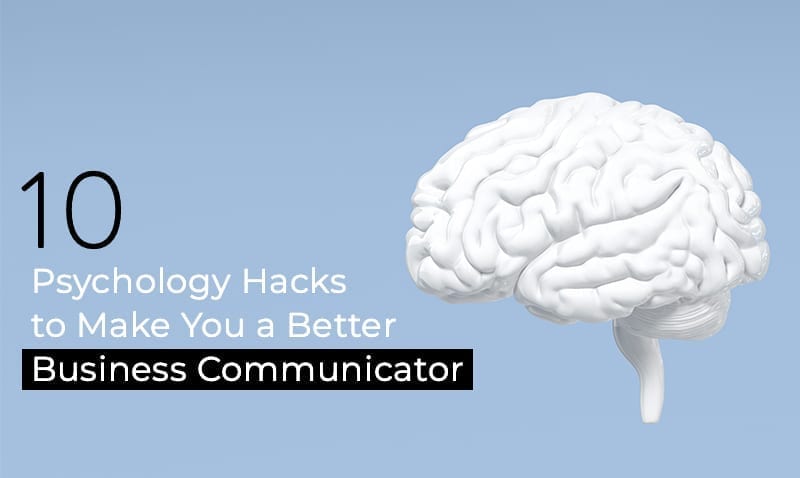Communication is essential to business. You need it to expand your network, smooth over situations, and help negotiations go your way. This is why the study of psychology is highly relevant to your business, as in daily life. Human interaction is a delicate, complicated thing. To navigate these choppy waters, you need to understand how other people’s minds work (generally speaking). Check out these psychology-related tips for becoming a communication pro:
Make them feel good.
1 | Discover someone’s self-image, and go with it.
People are attached to the image they have of themselves. When you show your belief and support for that image, they will feel appreciated; otherwise, they may feel attacked. Remember, it’s not what you say, but how you make them feel.
2 | Check their eye color and say their name.
When saying your hellos, prolong your eye contact for a millisecond—long enough for you to see the color. This tactic makes you appear more open and trustworthy. Bonus tip: ask them what name they like to go by, and call them that at least once before the meeting ends.
3 | Ask questions.
People appreciate being valued. Showing interest is a sign of genuine communication and respect.

Get what you want.
4 | Sit next to the big bad wolf.
Perhaps you’re dreading meetings because of that one person who doesn’t like you, or maybe you are in trouble with your boss (oops). Try sitting next to them in your meeting! If confrontation is what you’re afraid of, remember it’s easier to talk to someone from across a conference table than turn to the person beside you.
5 | Door in the face.
Put forward a large request, which isn’t likely to be granted. When you’re rejected, keep it cool; make light of the situation. Later, put forward your real request — a smaller one. The person you’re talking to may feel bad about not granting your first request, and now feel more inclined to help you out with your smaller ask. Use your discretion, though. If doubtful, you can try:
6 | Foot in the door.
The opposite of the door-in-the-face approach, putting your foot in the door means building up small yeses until you get that one big yes. Isn’t the paint job great? This sound system is smooth, huh? Try the seat — comfortable, isn’t it? The price isn’t bad, wouldn’t you say? So — do you want this car?
7 | Use silence as a prompt.
Unsatisfied with an answer? Don’t follow up with a question; don’t say anything. Chances are, the other person will want to fill up the silence with more information.
8 | Present your argument before your stance.
By presenting genuine thoughts, you’re showing openness for discussion, rather than a dead-end statement. This works in everyday conversation as well as in business settings. For example, “Tofu and beans are my fave proteins” will go down easier than a food-debate-provoking, “I’m a vegan,” especially when the conversation’s young.

Build yourself up.
9 | Reframe stress into courage.
Moments of stress and courage have similar physical effects: increased heart rate, and shortness of breath. When you’re stressed about an upcoming meeting, tell yourself that this physical reaction is your body being courageous.
10 | Assume comfort.
When you feel like retreating into yourself, remember that your body is your space. You have every right to be where you are, breathing, moving, speaking, and simply being. Confidence: fake it till you make it. It’s good for you, and for the vibes in the room.

It’s all about empathy
There’s no mathematically precise formula for communication. They say that some people are born with the gift of gab and charisma — but that’s no reason to give up on yourself if you haven’t got “it.” Empathy can be learned. Emotional intelligence can be practiced. It’s simply about being considerate of other people’s feelings as well as your own.
Like a dog sniffing out an impending rainstorm, humans can very quickly pick up on warmth, sincerity, and confidence. Interpersonal relations matter more — and pay off a lot more — than any book-smarts or public recognition. So keep that head up and that breath easy! You’ll do great.







